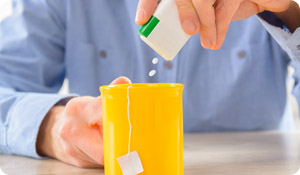
Researchers continue to discover new information about preventing and managing diabetes. Here are two recent findings and what they might mean for you.
1. Intermittent Fasting. Fasting—the process of limiting food intake for some predetermined time—has long been dismissed as an unhealthy “quick fix” approach to dieting. But new research suggests that intermittent, or sporadic fasting, seems to improve health, reduce the incidence of diseases such as cancer, and increase longevity—at least in animals. So it’s no surprise that researchers are studying fasting with regard to diabetes and weight loss, since many people who have diabetes are also overweight or obese.Preliminary studies find that intermittent (1 to 3 days per week) or alternate day (every other day) fasting may help with weight loss and may help protect patients’ hearts. Intermediate or alternate day fasting also seems to improve how sensitive you are to insulin, the hormone needed to help metabolize [convert food into energy]; people with diabetes are less sensitive to insulin’s effects (insulin resistant). With both intermittent and alternate day fasts, participants reduce their food intake by 500 to 600 calories (or 25 percent of normal consumption) on fasting days.
2. Artificial Sweeteners. Artificial sweeteners are promoted as a good alternative to sugar, especially in beverages like soda. However, in people who have diabetes, there is a link between frequent consumption of artificial sweeteners and negative results, such as being overweight or obese.A new study suggests that artificial sweeteners affect how your body uses glucose because of the way they interact with the bacteria found naturally in the gut. Your body doesn’t absorb artificial sweeteners (as it does sugar), but as the sweeteners pass through the gastrointestinal system, the bacteria release substances that cause an inflammatory response, which changes how your body uses sugar.
Keep in mind: a link between two factors does not mean there is definite cause and effect. Furthermore, we know consuming sugar and artificially sweetened beverages both correlate with increased health risks.
The Bottom Line
So, what does this mean for people with diabetes? Until researchers have more data, not much.
For would-be calorie-cutters, "While intermittent fasting has been touted as a way to reduce calories, it isn’t practical for many," says Amber Taylor, MD, director of The Diabetes Center at Mercy Medical Center in Baltimore. "Unfortunately, many people tend to overeat when starved of calories for too long. They then make poor food choices if they don’t eat regularly. This may be a good option for particular individuals, but I don’t recommend it routinely."
With regard to artificial sweeteners, Taylor is equally skeptical: "Gut bacteria are a hot area of research and the evidence is evolving every day," says Taylor. "However, when it comes to artificial sweeteners for patients with diabetes, the choice is clear. I would definitely recommend an artificial sweetener over using regular sugar. We know the dangers of uncontrolled blood sugar and this is not an acceptable option. As with most things, I recommend everything (including diet soda) in moderation!"
Amber Taylor, MD, reviewed this article.
Sources
Amber Taylor, MD. Email message to author, October 15, 2014.
Brown, James E, Michael Mosley, and Sarah Aldred. "Intermittent Fasting." British Journal of Diabetes and Vascular Disease 2013 13(2): 68-72.
Barnosky AR, KK Hoddy, TG Unterman, KA and Varady. "Intermittent Fasting vs. Daily Calorie Restriction for Type 2 Diabetes Prevention: A Review of Human Findings." Translational Research 2014 164(4): 302-311. doi: 10.1016/j.trsl.2014.05.013. Epub 2014 Jun 12.
Whitaker, Julian, MD. "Reverse Diabetes with the Mini-Fast Program." Dr. Whitaker. Last reviewed 02/18/2014. Accessed October 15, 2014.
"Gut Bacteria, Artificial Sweeteners and Glucose Intolerance." Weizman Institute of Science. September 17, 2014. Accessed October 15, 2014.
Swithers, Susan E. "Artificial Sweeteners Produce the Counterintuitive Effect of Inducing Metabolic Derangements." Trends in Endocrinology and Metabolism 2013 xx: 1–11. doi.org/10.1016/j.tem.2013.05.005.
Walters, D. Eric. "Can Diet Soft Drinks Make You Fat?" Medscape Medical News. September 16, 2013. Accessed October 15, 2014.





